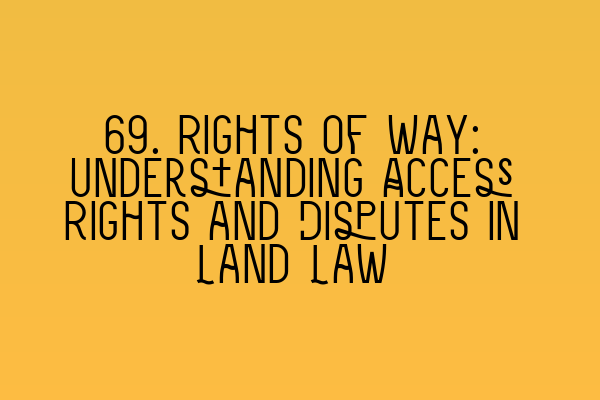69. Rights of Way: Understanding Access Rights and Disputes in Land Law
Welcome to the SQE Property Law & Land Law blog, where we provide expert insights and analysis on various legal topics. In today’s article, we will dive into the intricate world of access rights and disputes in land law, specifically focusing on rights of way.
Access to land is an essential aspect of property ownership. However, conflicts can arise when neighboring property owners disagree on the right to access certain areas. Understanding the legal framework surrounding rights of way is crucial in resolving these disputes and ensuring fair and proper use of the land.
What is a Right of Way?
A right of way is a legal right granted to a person or entity, allowing them access to a particular area of land owned by someone else. The right can be granted in various forms, such as an easement, a formal agreement, or even by prescription, which is acquired through long-term usage.
There are generally two types of rights of way:
- Private Rights of Way: These are rights granted to specific individuals or entities, generally for accessing their own property. Private rights of way can be further categorized into express rights of way (created through a written agreement) and implied rights of way (created through the circumstances surrounding the property).
- Public Rights of Way: These are rights that allow the general public to access certain areas of land. Public rights of way can include footpaths, bridleways, or even roads and highways.
Resolving Access Disputes
Access disputes can arise when there is uncertainty or disagreement regarding the existence or extent of a right of way. These disputes can have significant implications for property owners, as they may limit the use and development of the land.
When faced with an access dispute, it is essential to seek professional legal advice. An experienced property law solicitor can assist in determining the existence of a right of way, interpreting any legal documents, and negotiating with the other party to reach a resolution.
The legal principles guiding access disputes are complex, involving considerations of historical usage, intentions of the parties involved, and the impact on neighboring properties. It is crucial to have a comprehensive understanding of land law to effectively navigate these disputes.
Importance of SEO for Property Law Firms
As a property law firm, it is essential to optimize your website for search engines to attract potential clients. Implementing effective SEO strategies can help your firm rank higher in search engine results, increase online visibility, and drive targeted traffic to your website.
At SQE Property Law & Land Law, we understand the importance of SEO for law firms. Our team of SEO experts can help you develop a tailored strategy to improve your online presence, generate valuable leads, and ultimately grow your business.
Related Articles:
- SQE 1 Practice Exam Questions
- SQE 1 Practice Mocks FLK1 FLK2
- SQE 2 Preparation Courses
- SQE 1 Preparation Courses
- SRA SQE Exam Dates
Conclusion:
Understanding rights of way and access rights is crucial in property law. Whether you are dealing with a private or public right of way, resolving disputes requires expert legal advice to ensure fair and equitable usage of the land. As a property law firm, mastering SEO strategies can help you attract clients and grow your business exponentially.
If you need assistance with access disputes, property law, or SEO for your law firm, contact SQE Property Law & Land Law today. Our team of experienced solicitors and SEO experts is here to help you navigate the complexities of property law and successfully market your firm online.
